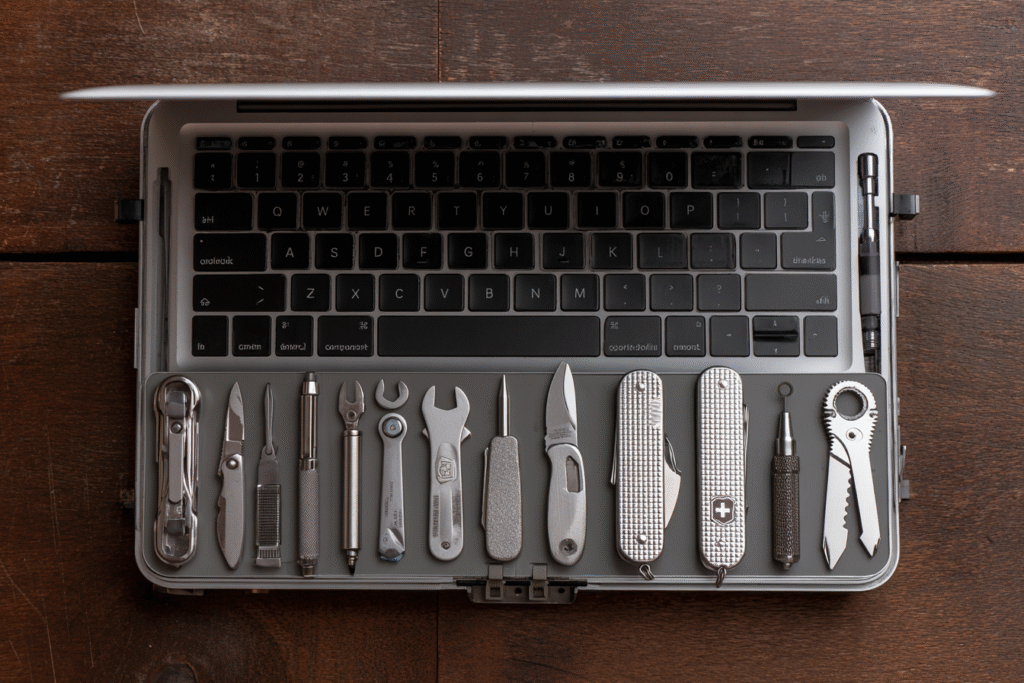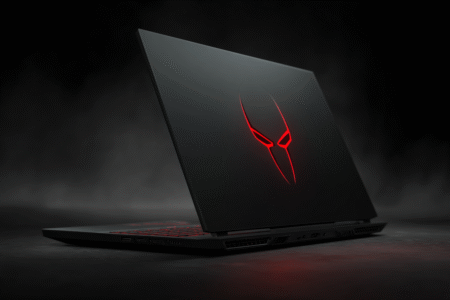When you picture a gaming laptop, your mind probably jumps to a flashy device with pulsing rainbow lights, aggressive angles, and a logo that looks like it belongs to a sci-fi alien race. For years, I thought the same thing. They seemed like niche toys, completely out of place in a professional setting. Then, about three years ago, my old work-issued laptop choked on a big video project, and I had to finish it on my personal gaming rig at home. The difference was night and day. That’s when the lightbulb went off. So, Can gaming laptops be used for work?
The answer is a resounding yes. In fact, for many people, they are one of the smartest, most powerful, and versatile tools you can buy for your job.
These machines are not just for play. Beneath the often-bold exterior lies a powerhouse of components that can handle demanding professional tasks with ease. Consequently, what makes them great for running the latest blockbuster games also makes them fantastic for crushing massive spreadsheets, editing high-resolution video, and compiling complex code. It’s time to look past the gamer aesthetic and see these laptops for what they truly are: incredibly capable workhorses in disguise.
More in Laptop Selection Category
Are Gaming Laptops Good for School
What Is the Best Gaming Laptop
What Exactly Makes a Gaming Laptop a Secret Workhorse?
The magic behind a gaming laptop’s professional prowess isn’t a secret; it’s simply the high-end hardware packed inside. Manufacturers build these machines to handle the most demanding graphical and computational loads, which, as it turns out, are also required by many professional applications. Therefore, the features that deliver a smooth, immersive gaming experience translate directly into a faster, more efficient workflow.
It’s All About the Powerful Processor (CPU)
First and foremost, at the heart of every gaming laptop is a powerful Central Processing Unit, or CPU. Gaming requires the processor to handle countless calculations per second, from in-game physics to artificial intelligence. As a result, these laptops typically come with high-performance CPUs like an Intel Core i7 or an AMD Ryzen 7, often with multiple cores and threads.
This multi-core strength is a massive benefit for work. For instance, if you’re a programmer, compiling code can be significantly faster. If you work with large datasets or complex formulas in Excel, the laptop won’t freeze or lag. In my case, running multiple applications at once—like having Photoshop, a dozen browser tabs, Slack, and Spotify open simultaneously—is a breeze. The laptop never stutters, which is a huge upgrade from the frustrating pauses I used to endure on standard office laptops.
The Graphics Card (GPU) Isn’t Just for Games
The most defining feature of a gaming laptop is its dedicated Graphics Processing Unit, or GPU. While its main job in gaming is to render stunning visuals, this powerful component is also a game-changer for many professional tasks. This is because modern software has increasingly started to use the GPU to accelerate its performance, a process known as hardware acceleration.
For creative professionals, this is a non-negotiable feature. Consider these examples:
- Video Editors: Software like Adobe Premiere Pro and DaVinci Resolve uses the GPU to speed up rendering times dramatically. A project that might take an hour to export on a regular laptop could be finished in fifteen minutes.
- Graphic Designers: Working with large, multi-layered files in Photoshop or Illustrator becomes incredibly smooth. There is no lag when applying complex filters or effects.
- 3D Artists and Architects: Programs like Blender, AutoCAD, and Revit rely heavily on the GPU for rendering models and navigating complex 3D environments. A powerful GPU means a fluid, interactive design process.
In fact, the first time I edited a 4K video on my gaming laptop, I was shocked. The timeline scrubbing was perfectly smooth, and the final render finished in less than half the time I was used to. That efficiency directly translates to meeting deadlines and reducing stress.
Why Blazing-Fast RAM and Storage Matter for Productivity
Finally, gaming laptops don’t skimp on memory (RAM) and storage. Games require a lot of RAM to load assets quickly, so these machines usually come with 16GB or even 32GB of fast RAM. For work, this means you can multitask without your system slowing to a crawl. You can keep all your essential apps and browser tabs open without worrying about performance hits.
Similarly, they almost always include a super-fast solid-state drive (SSD), typically an NVMe model. This makes a huge difference in daily use. The computer boots up in seconds. Programs and large files open almost instantly. When you’re constantly opening and saving large project files, this speed saves you a surprising amount of time and keeps you in the flow of your work.
Who Should Seriously Consider a Gaming Laptop for Their Job?
While a gaming laptop can benefit almost any user by providing a snappier experience, some professions stand to gain the most from this immense power. If your job involves anything more demanding than writing emails and browsing the web, you are likely a prime candidate. These machines are essentially portable workstations that can handle tasks that would bring a standard-issue business laptop to its knees.
For the Creative Professionals: Video Editors, Graphic Designers, and 3D Artists
This group is perhaps the most obvious beneficiary. The combination of a top-tier CPU, a powerful GPU, and loads of fast RAM is the holy trinity for creative applications. I’ve already mentioned my own experience with video editing, but it applies across the board.
For example, a graphic designer can work on massive print-resolution files without any stuttering. A 3D artist can manipulate complex models in real-time instead of waiting for the computer to catch up. For these professionals, time is money, and a gaming laptop can shave hours off project timelines, which ultimately makes their business more profitable and their work less frustrating.
For the Tech Crowd: Programmers, Data Scientists, and Engineers
Next up are the tech professionals. Their work is often just as demanding as creative tasks, though in different ways.
Here’s how a gaming laptop helps them:
- Programmers and Software Developers: Compiling large codebases is a CPU-intensive task. A powerful processor can cut that compilation time down significantly. Furthermore, many developers use virtual machines or containers (like Docker) to create isolated environments, which consume a lot of RAM. A gaming laptop with 32GB of RAM can handle multiple instances without breaking a sweat.
- Data Scientists: Working with massive datasets and running machine learning models requires serious computational power. The GPU in a gaming laptop, specifically those from NVIDIA, can be used with CUDA cores to accelerate the training of these models, turning a day-long process into a matter of hours.
- Engineers: Engineering students and professionals using CAD software like SolidWorks or ANSYS for simulations will find that a gaming laptop’s robust GPU and CPU make for a much smoother experience.
Even for the “Typical” Office Worker?
Surprisingly, yes. While it might seem like overkill, the power of a gaming laptop can improve the quality of life for a power user in an office setting, too. Think about the person in your office who lives in Microsoft Excel—the one who builds spreadsheets with tens of thousands of rows, complex macros, and pivot tables. A powerful CPU will make those calculations instantaneous. Similarly, someone who creates detailed PowerPoint presentations with embedded high-resolution videos will appreciate the smooth, lag-free experience. The ability to have fifty browser tabs open for research while on a video call without a single hiccup is a luxury that, once you experience it, is hard to live without.
But It’s Not All Perfect, Right? Let’s Talk About the Downsides
Of course, if gaming laptops were the perfect solution for everyone, business laptops wouldn’t exist. There are some very real trade-offs to consider before you decide to buy one for work. These machines are designed with performance as the absolute top priority, and consequently, other aspects can suffer. Being aware of these potential drawbacks is crucial.
The Elephant in the Room: Battery Life
Let’s be blunt: the battery life on most gaming laptops is terrible. The powerful components, like the dedicated GPU and the high-performance CPU, are incredibly power-hungry. While you might be able to get a few hours of light work done, like web browsing or typing, don’t expect to last a full workday away from an outlet.
I learned this the hard way once. I went to a client meeting, confident I had a full charge. However, after about 90 minutes of showing a project preview that used the GPU, my screen went black. It was embarrassing and unprofessional. Now, I never leave the house without the massive power brick that comes with it. If your job requires you to be mobile and work away from a desk for long periods, this is a major factor to consider.
Can You Carry It to a Coffee Shop? Weight and Portability Concerns
Along with the giant power brick comes the laptop itself, which is often significantly heavier and bulkier than an ultrabook or a MacBook Air. All those powerful components generate a lot of heat, which requires a substantial cooling system with large fans and heat pipes. This adds considerable weight and size.
While modern designs are getting slimmer and lighter, a high-performance gaming laptop can still easily weigh over 5 pounds (or 2.3 kg), with the power adapter adding another couple of pounds. Carrying that around in a backpack all day is noticeable. If you travel frequently or have a long commute on public transit, the heft can become a real burden.
That “Gamer” Look: Aesthetics in a Professional Setting
While many brands now offer models with more subdued and professional designs, the stereotypical “gamer” aesthetic is still very common. Aggressive lines, large logos, and extensive RGB lighting might be fun at home, but they can look out of place in a conservative corporate boardroom.
Fortunately, on almost all models, you can turn the keyboard backlighting to a simple white or disable it completely. However, the overall design might still scream “gamer.” For some, this doesn’t matter at all. For others who are client-facing, it could be a point of concern. You have to decide if the look of your laptop matters in your professional environment.
Can Gaming Laptops Be Used for Work and Is It a Smart Financial Choice?
When you start looking at the prices, you might notice that a well-equipped gaming laptop costs a fair amount of money, often starting around $1,200 and going up from there. This leads to an important question: are they actually a good value for professional work? In many cases, the answer is a definitive yes. The key is to compare them not to standard consumer laptops, but to professional mobile workstations.
Comparing the Price Tag: Gaming vs. Professional Workstations
Mobile workstations, like a Dell Precision or an HP ZBook, are specifically designed for demanding professional tasks. They often have certified drivers and extra security features. However, they also come with a very steep price tag.
When you compare the raw specifications—CPU, GPU, RAM, and storage—a gaming laptop frequently offers significantly more performance for your money. For instance, a gaming laptop with a high-end graphics card might cost ,800. A mobile workstation with a comparable “professional” graphics card could easily cost over $3,000. For freelancers, small business owners, or even larger companies looking to maximize their hardware budget, the value proposition of a gaming laptop is hard to ignore.
The Versatility Factor: One Machine for Everything
Perhaps the biggest advantage is that you get one device that does everything exceptionally well. It is a dual-purpose investment. During the day, it’s a powerful workstation that can handle any project you throw at it. After hours, it’s a high-end entertainment machine for gaming, watching movies, or diving into creative hobbies.
This consolidation is not just cost-effective; it’s also convenient. You don’t need a separate desktop for gaming and a laptop for work. You have one portable, powerful machine that covers all your bases. This simplicity is a powerful argument in its favor.
How Do I Choose the Right Gaming Laptop for My Work Needs?
So, you’re convinced. A gaming laptop seems like the right fit for your work. Now comes the hard part: choosing one. The market is flooded with options from dozens of brands, each with confusing model numbers and specifications. The key is to ignore the marketing hype and focus on the components and features that will directly benefit your specific workflow.
Focus on What Matters for Your Job
Not all demanding work is the same. The ideal laptop for a video editor is different from the ideal laptop for a programmer. You need to identify your primary bottleneck and choose a machine that excels in that area.
Here is a simple breakdown to guide you:
- For CPU-heavy tasks (programming, data analysis, complex spreadsheets): Prioritize getting the best processor you can afford. A powerful GPU is less critical, so you can save money by choosing a model with a mid-range graphics card.
- For GPU-heavy tasks (video editing, 3D rendering, design): The graphics card is your most important component. Allocate most of your budget here. A strong CPU is still important, but the GPU will provide the biggest performance boost.
- For general power-user multitasking: Look for a balanced system. A solid CPU and a capable mid-range GPU, combined with at least 16GB of RAM, will provide a smooth experience across a wide range of tasks.
Don’t Forget the “Boring” Stuff: Screen, Keyboard, and Ports
The core components get all the attention, but the supporting features are what you interact with all day. Don’t overlook them.
First, the screen is crucial, especially for creative work. Look for a display with good color accuracy—something that covers 100% of the sRGB color gamut is a great starting point. A bright screen is also important if you ever work near a window. High refresh rates (like 144Hz) are a gaming feature, but they also make everyday tasks like scrolling through websites feel incredibly smooth.
Second, the keyboard and trackpad are vital. Since you’ll be typing a lot, you want a keyboard with comfortable key travel and a sensible layout. If possible, try to test one in a store before you buy.
Finally, check the port selection. One of the unsung benefits of larger gaming laptops is that they usually have a generous array of ports: multiple USB-A ports, HDMI or DisplayPort for external monitors, and often a Thunderbolt port for high-speed data transfer. This can save you from the nightmare of carrying and potentially losing a bag full of adapters. For more guidance on what to look for when purchasing a new computer, university tech departments often provide excellent, unbiased advice, such as this helpful computer buying guide from the University of Michigan.
A Final Thought on the Question: Can Gaming Laptops Be Used for Work?
So we return to the central question. After years of using one myself, my answer is not just “yes,” but an enthusiastic recommendation for the right kind of professional. These machines are the undisputed champions of performance-per-dollar in the laptop world.
You have to be willing to accept the trade-offs, mainly the poor battery life and extra bulk. But if your work demands power and you spend most of your time at a desk, those downsides fade into the background. What you’re left with is a tool that removes technical limitations and allows you to work faster and more efficiently. My gaming laptop has been a reliable partner, seamlessly transitioning from a demanding client rendering job in the afternoon to a relaxing gaming session in the evening. It’s not a toy; it’s a powerful, versatile tool that just so happens to be fun, too.
Frequently Asked Questions

Is a gaming laptop a good choice for professionals who travel frequently?
While gaming laptops offer excellent performance, their weight, size, and short battery life can be drawbacks for frequent travelers. However, if portability is less of a concern and high performance is prioritized, they can still be a suitable option with careful planning.
How can I make a gaming laptop more suitable for a professional office environment?
You can choose a gaming laptop with a subtle, professional design, disable RGB lighting, use external accessories like a docking station, monitor, and ergonomic peripherals, and create separate user profiles for work and play to keep environments organized and distraction-free.
What are the common challenges of using gaming laptops for work?
Common challenges include shorter battery life due to powerful hardware, heavier and bulkier design making portability difficult, potential unprofessional appearance due to gaming-oriented aesthetics, and noise from cooling fans during intensive tasks.
What are the main advantages of using a gaming laptop for work?
The main advantages include high-performance GPUs for tasks like video editing and rendering, fast CPUs for multitasking and compiling code, high-quality screens with accurate colors perfect for creative work, and the ability to handle demanding professional applications with ease.
Can gaming laptops be used effectively for professional work?
Yes, gaming laptops can be used effectively for professional work as they are equipped with powerful GPUs, high-end CPUs, and high-quality screens, making them suitable for tasks such as video editing, 3D modeling, graphic design, and programming.





